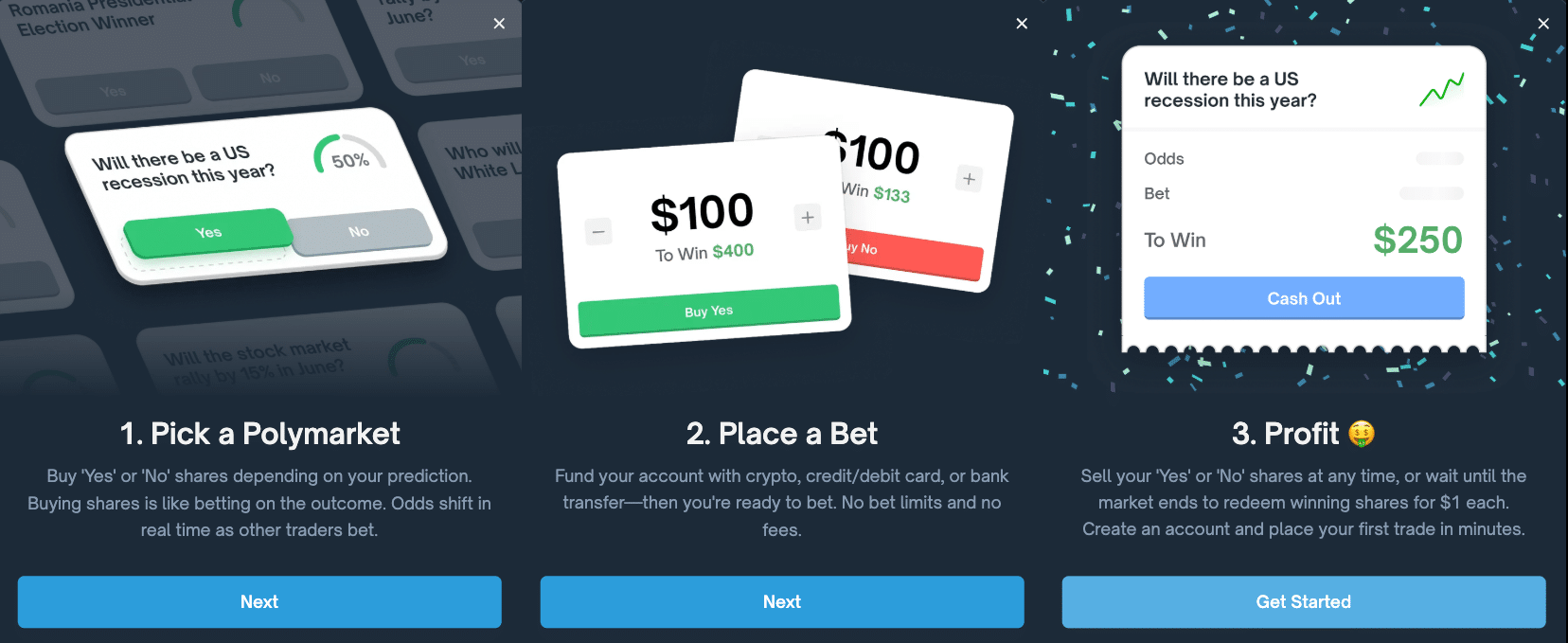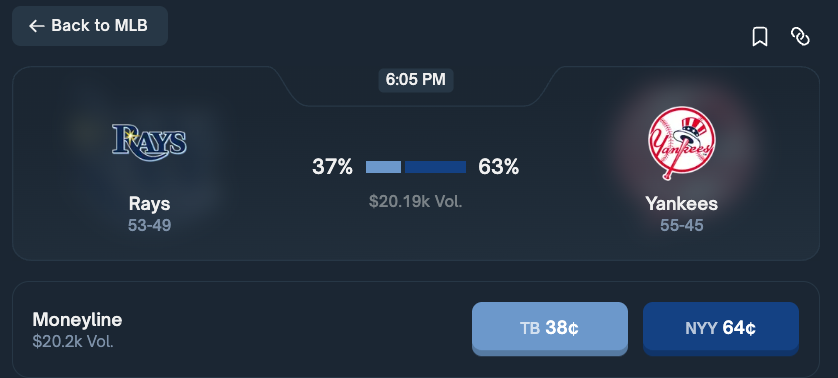Polymarket Review
Polymarket is returning to the USA.
The platform, which offers yes/no contracts on future events ranging from sports to politics, launched in 2020 and quickly gained traction thanks to its minimal fees and nationwide availability.
However, Polymarket exited the US market in 2022 after reaching a settlement with the Commodity Futures Trading Commission (CFTC) for offering unregulated financial products.
In July 2025, Polymarket announced it had acquired QCEX, a CFTC-registered exchange, and would soon reopen its doors to US customers.
Read on for a complete Polymarket review, where we’ll explain the significance of the announcement and what that means for users. This review also describes how Polymarket works and what distinguishes it from traditional online sportsbooks.
- Available in all 50 states
- Trade yes/no predictions
- Minimal fees expected
Pros
Industry-low fees Nationwide availability Trade sports, weather, politics, and more Highly positive reputationCons
Liquidity issues in niche markets Limited in-play trading Limited props and parlays
How Polymarket Works

Polymarket is a prediction markets exchange that allows users to trade event contracts based on yes/no outcomes, which isn’t as technical as it sounds. Think questions like:
- Will the Dallas Cowboys win Sunday’s game?
- Will the temperature in NYC exceed 80 degrees tomorrow?
Each market (or question) is accompanied by YES and NO contracts that users can trade at prices ranging from $0 to $1.
Contracts settle at $1 if the outcome occurs and $0 if it does not. Your profit or loss is determined by the difference between how much you paid for a contract and its settlement value.
Peer-to-Peer Prediction Contracts
Unlike standard US online sportsbooks, Polymarket is a peer-to-peer marketplace where users trade directly among one another. As a result, prices reflect the collective sentiment of whether an event will happen (yes or no).
Although binary contracts only resolve with yes or no outcomes, that doesn’t mean markets are limited to yes/no questions only.
For example, a typical Polymarket sports market might ask which team will win Sunday’s NFL game. In that case, Polymarket will offer yes and no contracts for each team. However, it only displays YES contracts for each team by default to maintain an intuitive interface.
Polymarket Example
Consider this market from a game between the Tampa Bay Rays and the New York Yankees:

Looking at this market, we can see that:
- YES contracts on the Yankees are trading at $0.64, which translates to a collective belief that the Yankees have a 64% likelihood of winning.
- YES contracts on the Rays are trading at $0.38, which translates to a roughly 38% chance of victory, according to Polymarket users.
Now, let’s imagine you believe the Rays will win, so you buy 100 YES contracts at $0.38 each for a total cost of $38. If you keep the contracts until expiry, there are two possible outcomes:
- The Rays win: Your contracts settle at $1 each for a total payout of $100. Your net profit is $62.
- The Yankees win: Your contracts settle at $0 each for a total loss of $38.
Polymarket Sports Markets
Polymarket offers a broad range of sports event contracts spanning professional and collegiate sports in the US, international leagues, esports, and more.
Generally, Polymarket offers three categories of sports event contracts:
- Game Winners: Short-term markets based on the outcomes of specific teams (will Team A or Team B win)
- Futures: Medium to long-term markets based on league, conference, and division winners
- Prop-Style Futures: Medium to long-term markets like the season home run leader, will player X get engaged, who will headline the Super Bowl halftime show, will X stadium be renamed, etc.
The current sport and league lineup includes:
- Football: NFL and collegiate game winners; division, conference, and league champions; Super Bowl predictions; season-long team and player stats
- Baseball: MLB and college games winners; league, division, and World Series champions; MVPs; Cy Young winners; team season wins
- Basketball: NBA, WNBA, and CBB game winners; NBA and March Madness champs; conference champs; star player trade rumors; MVPs; Rookie of the Year awards
- Hockey: Game winners; Stanley Cup champions; player trades; season-long player stats;
- Soccer: MLS and various international leagues (EPL, UEFA, UCL, etc.) game winners and champions; World Cup qualifiers/winners;
- Golf: PGA and LPGA tournament winners; Ryder Cup winner; Ryder Cup team qualifiers/picks; various others like US President days spent golfing, Internet Invitational winner, etc.
- MMA: UFC fight outcomes; associated UFC props like celebrity crowd appearances, streaming rights, etc.
- Cricket: ICC and IPL match winners
- Tennis: ATP and WTA Grand Slam winners; player-specific futures (e.g., will X win a Major this year)
- F1: Drivers and Constructors champions; race winners; pole winners; head-to-head driver and constructor matchups; driver futures (e.g., will X leave his team before X date)
- Boxing: Fight winners; method of victory
- Esports: Tournament and matchup winners for CS2, League of Legends, Valorant, etc.
- Other: One-off events and niche sport championships (e.g., SailGP Championship, MotoGP Championship, etc.) and indirectly sports-related events (e.g., a past market asked whether Caitlin Clark’s stalker would plead guilty)
Some examples of past sports prediction markets include:
- Will the Toronto Blue Jays or Baltimore Orioles win tonight’s game?
- Who will win the Super Bowl
- Who will be the MLB’s stolen bases leader this season?
- Which teams will make the College Football Playoff?
- Which NBA stars leave their team this year
Other Polymarket Prediction Markets
In addition to sports, Polymarket hosts hundreds of markets across categories and subcategories, ranging from politics to entertainment awards.
Polymarket’s other top-level categories include:
- Politics: Approval ratings; policy decisions; international relations; high-profile court cases; US cabinet selections; war
- Middle East: Regional conflict; military actions; negotiations; internal politics
- Crypto: Bitcoin/crypto prices; ETF approvals; market caps; companies buying/selling BTC
- Tech: AI benchmarks and model release dates; self-driving car milestones; tech company acquisitions and leadership changes; space missions; drug approvals
- Culture: Box office gross figures; Nobel Peace Prize; Person of the Year; video games; celebrity divorces and legal issues; Emmys; Academy Awards; pandemics and disease outbreaks
- Weather: Daily temperatures by city; monthly temperatures; natural disasters
- World: Country-specific politics, conflict, and relations
- Economy: Inflation rates; interest changes; stock indices; GDP growth; tariffs; jobs reports; other economic indicators
- US President: Current Presidential news predictions; pardons; countries visited; public appearances; approval ratings; executive orders
- Elections: Country-specific elections; US city, state, and federal elections; US Presidential party nominations
- Mentions: Whether speakers will use specific words or how many times they’ll use certain words during upcoming speeches or appearances
Some examples of past non-sports markets at Polymarket include:
- Who will win the next US Presidential election?
- Will the current Fed Chair be removed this year?
- What price will Bitcoin hit in July?
- Will there be a 7.0+ earthquake by the end of next month?
- Will there be a bird flu pandemic this year?
- Will the next James Bond be British?
- Will Russia and Ukraine sign a ceasefire by the end of 2026?
Who Can Use Polymarket?
Although Polymarket hasn’t yet announced its eligibility requirements for US customers, it will probably follow the example set by other CFTC-approved prediction markets like Kalshi and Crypto.com.
If so, users will have to meet these requirements to trade Polymarket contracts:
- Be 18 or older
- Live in the United States
- Have a government-issued photo ID
Additionally, Polymarket’s entrance into the US market makes the platform subject to federal Know Your Customer (KYC) laws and identity verification.
That means Polymarket must ask new users to verify their identities by supplying the following:
- First and last name
- Date of birth
- Residential address
- A copy of a government-issued photo ID
Polymarket Deposit Options
The platform runs on the Polygon blockchain, and all trades are conducted using USDC, a cryptocurrency pegged to the US dollar.
There are several ways to fund your Polymarket account:
- Transfer cryptocurrency directly to your account: Log in, select “Deposit,” then select “Transfer Crypto,” and follow the on-screen instructions to deposit ETH, USDC, SOL, and other tokens.
- Deposit with Coinbase: Select this option to transfer funds directly to Polymarket from your Coinbase account.
- Deposit cash with Visa, Mastercard, or bank transfer: Use MoonPay to fund your Polymarket account with cash from your Visa, Mastercard, or bank account.
- Deposit USDC directly to your account: Select “Deposit USDC” to move USDC coins directly from an exchange or wallet to the wallet address displayed on the deposit screen.
Polymarket Fees
Although Polymarket hasn’t yet launched, its US-facing rules website (polymarketexchange.com) offers a potential preview of what to expect regarding trading fees. Polymarket hasn’t yet confirmed that the following fee schedule will apply, but if this holds true, it will offer industry-low fees.
Expected Polymarket Fee Formula:
1 basis point (0.01%) on the Total Contract Premium on Taker Orders
In other words, when you place a taker order (an immediate order that you want to be filled at the current market price), you’ll pay 0.01% on your order’s total cost.
For example:
- You place a Taker Order to buy 100 “Yes” contracts at $0.75
- Total Contract Premium: 100 x $0.75 = $75
- Taker fee: $75 x 0.0001 = $0.0075
Polymarket rounds all fees to the nearest basis point, and the minimum fee for any trade is one basis point ($0.0001).
Polymarket App & User Experience
Polymarket features a sleek, user-friendly interface optimized for both novices and experienced traders.
The design emphasizes clarity, with market predictions displayed prominently, alongside real-time updates on pricing and probability. Market pages are structured intuitively, allowing users to quickly access relevant market details, including current odds, historical price movements, and liquidity indicators.
- Advanced filtering and sorting options allow users to easily find markets based on categories, volatility, and closing timelines.
- Real-time notifications and updates enhance responsiveness and trading efficiency.
- Clear visuals, including graphs and charts, illustrate market trends and price history effectively, supporting informed decision-making.
Social Features
Most notably, Polymarket provides a leaderboard that ranks traders based on their profit and loss performances over various time periods, such as weekly and all-time.
Users can access public profiles of top traders, viewing their open positions, historical trades, and overall portfolio strategies.
Additionally, Polymarket maintains a dedicated Discord server where users discuss market insights, share predictions, argue over their predictions, and showcase their winning plays.
A community feed attached to each open market displays recent trades and discussions, where users can interact and criticize one another’s analyses.
Polymarket also provides a feature for users to suggest new markets through an online form or community channels.
Polymarket Strengths & Weaknesses
Pros
- Minimal Fees: Minimal trading fees and zero deposit or withdrawal fees will be a significant advantage.
- Nationwide Accessibility: As a CFTC-registered platform regulated at the federal level, Polymarket is not regulated at the state level as a gambling platform. Instead, it is available in all 50 states as an even trading market.
- Diverse Markets: Polymarket offers markets on a wide array of topics beyond sports.
- Transparency: As a blockchain-based platform, all transactions are publicly viewable.
Cons
- Regulatory Uncertainty: The transition to a regulated US platform brings changes and unknowns for American users. Polymarket may implement KYC requirements (identity verification), add new deposit methods, and remove old deposit methods.
- Price Slippage: In less popular markets with lower liquidity, the price at which a trade is executed may differ from the expected price.
- Limited In-Play Trading: Although trading is active until a market closes, it lacks the kind of micro-betting markets that the best online sportsbooks offer today.
- No Responsible Gambling Tools: The current platform lacks dedicated tools for responsible trading, such as deposit limits or self-exclusion options.
Final Thoughts: Is Polymarket Legit?
Once it receives CFTC approval, Polymarket will become a legitimate, regulated trading platform for US sports fans. It already has an established track record and positive reputation, but it’s not the perfect fit for everyone due to some of its unique aspects.
Polymarket operates similarly to other prediction markets like Kalshi and Crypto.com, but it stands out for its blockchain-driven, decentralized model.
Polymarket’s approach enhances security and transparency, but users unfamiliar with cryptocurrency will find it more difficult to deposit and withdraw funds compared to other platforms (unless Polymarket introduces new deposit methods like straightforward credit card transactions and bank transfers).
However, unlike its chief competitors, Polymarket is still awaiting regulatory approval to serve US customers and may have to change key components of its model to adhere to US law.
Additionally, fans accustomed to online sportsbooks may find Polymarket’s lack of extensive in-play betting lines, parlays, and props comparatively limiting.


